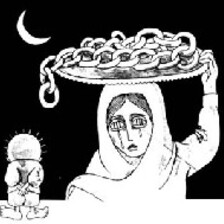He called to me from his doorway: ‘Please, come and look at my house. I want you to see what they have done to my home!’
There are chalk marks, Hebrew letters, on the wall beside his door. ‘These are drawn by the soldiers,’ he told me. ‘When a house has been searched, when the men have been arrested and taken away, when the children are left crying, then they mark it.’
He waved me into a room that looks like a rubbish dump: blankets and clothes were strewn over the floor, covered in muddy footprints and broken crockery. He stood in the middle of the room, looking around in bewilderment, shaking his hands in despair. ‘This was my home! What will I do now?’
Ibrahim, his wife and four children, spent three days hiding in an outhouse in the courtyard while Israeli soldiers used his house as a snipers’ nest: ‘A three day nightmare, with no water or food.’ I peered into the dank darkness: a room about two metres by two metres, with no windows, the walls covered in flies. ‘Each minute we wondered if the soldiers would come in and shoot us all in the next minute.’ He looked at me, wanting me to try and understand how that felt. ‘We could hear shooting, we could hear the tanks, we could hear screaming. Each minute seemed an eternity.’
